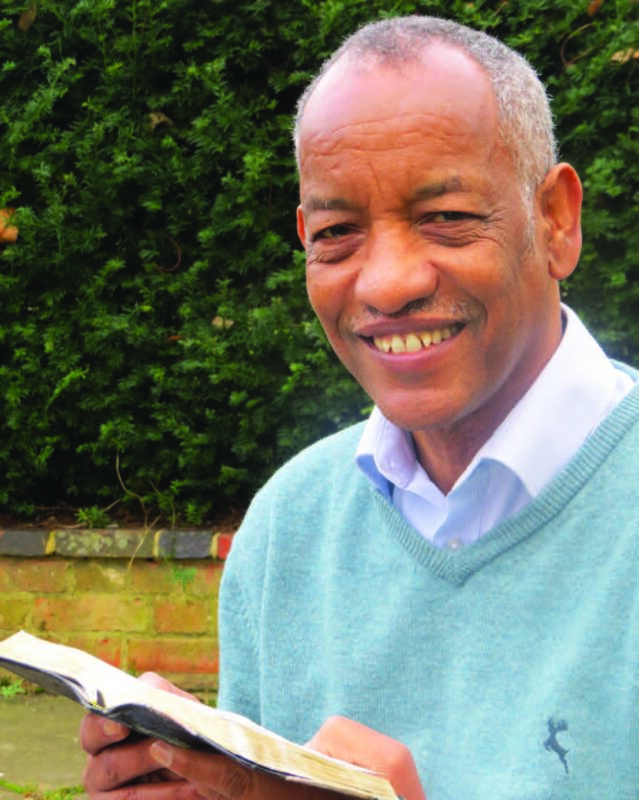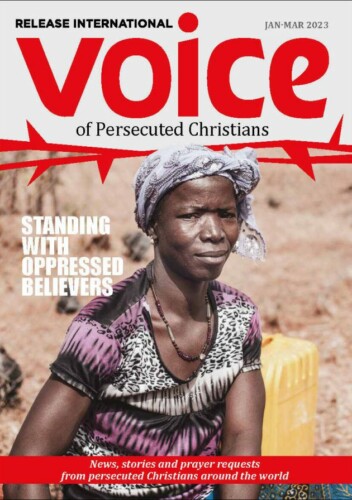From China and North Korea to Eritrea and Pakistan untold numbers of Christians across the world today are suffering behind bars. Some have been detained for many years but, helped by partners of Release International, they continue to follow their Saviour, writes Tom Hardie.

It may be difficult to determine the exact number of Christians behind bars but wherever they are – whether it’s an Eritrean prison, a North Korean labour camp or a Pakistani jail cell – they need our prayers.
Some have been locked away for more than a decade, separated from family and loved ones and suffering brutal conditions.
Dr Berhane Asmelash (pictured) says the main reason Christians are arrested or detained long-term in Eritrea is to break their spirit.
Fellowship vital for survival in Eritrea
In Eritrea alone, the persecution of evangelical Christians in the past two years is worse than it’s ever been, according to our partner, Dr Berhane Asmelash of Release Eritrea.
Since the Asmara Government ordered all evangelical and Pentecostal churches to be closed in 2002, thousands of Christians who belong to this group have been victims of arbitrary arrest, torture and disappearances.
The persecution is not confined to the non-recognised religious groups such as evangelicals and Pentecostals but several members of the legally recognised groups have also been victims of arrest and restrictions, such as the Orthodox, Catholics, Lutherans and Muslims.
Currently there are around 400 evangelical prisoners – 25 per cent of whom are deemed long- term (sentences of four years or more). These include Pastor Kiflu Gebremeskel and Rev Haile Naizgi from Full Gospel Church, who were arrested in 2004. They have not been charged, nor has Milion Gebreselassie, a nurse and anaesthetist, who has been in prison for more than nine years.
Three Orthodox clergy members, Dr Fitsum Gebrenigus, Dr Tekleab Mengisteab and Rev Gebremedhn, were arrested in November 2004 and remain in prison without trial.
Since March 2023, 130 have been imprisoned, while 28 long-term prisoners have been released, including 13 who had been locked away for around ten years.
‘We don’t know why they are releasing them now but the main reason for arresting or detaining them long term is because they want to break their spirit,’ Dr Asmelash said.
‘Once they think that prisoners are deteriorating emotionally – when they’ve broken them – then they release them.’
Which is the main reason why some are still detained even after many years. They remain strong in their faith. If they are well-educated then the authorities fear how they can influence others when they get out.
‘The Government is anti-education so anyone with a degree is a potential target. All of those in government have only elementary school education.’
For prisoners who are released because they have suffered breakdowns life outside can be equally difficult. ‘In prison they were active but when released they become paranoid.
A lot of the pastors won’t leave their homes, especially if they signed a document renouncing their faith. They are ashamed and don’t want to see other Christians. They regret it but there is no one to comfort them.’
Dr Asmelash said: ‘We offered one pastor I met, who had been in prison 16 years, help to start a new life but his brain had frozen. He comes to church, listens but doesn’t talk to anyone.
‘What we have learned from former prisoners is that fellowship is vital. They form a community in prison, pledging to one another not to compromise or renounce their faith, being prepared to die for it.
They understand what it means to be “crucified with Christ”, so they are strong whether in prison or outside. If you can stay with your group, then you can survive in prison.’
Prisoners are not allowed to read, even the official government newspaper, because the authorities want their brains to remain inactive.
‘They want them to forget even the alphabet so no reading material, including Bibles, is allowed,’ said Dr Asmelash. On top of that the food is mostly inedible so prisoners frequently lose weight and become unwell.
On top of these inhumane practices, visits from family are forbidden so it can be many years before they see each other again.
LIFE OUTSIDE
Sadly, even once they are freed a new set of challenges arises, including trying to find accommodation, because landlords will not rent to anyone who has been in jail.
Most would go to live with their extended families but former prisoners, especially women, are often abandoned by those closest to them. Previously their families wanted them to study, marry and have children but after 14-15 years in prison they could be aged in their early 40s and seen as unable to contribute. Their only option may be to stay with friends, having to move on every few days to avoid questions from suspicious landlords.
Release Eritrea helps pay for accommodation and healthcare; prisoners can leave detention with serious medical issues. One woman who was released weighed only 34kg (5 stones 5 pounds), while another, a Christian singer who was denied release in order to have treatment for cancer, was set free only when the authorities were certain he would die.
As well as supporting hundreds of former prisoners, the ministry has helped about 2,000 Christians displaced by the Tigray conflict who need food, housing and healthcare.
It also assists Christians who have escaped the country to retrain in their new homeland. ‘In the past three years we have trained 815 people to start their own businesses, for example, in cooking, tailoring or photography,’ said Dr Asmelash.
A story of redemption
My name is ‘Mebrhit’* and I accepted Jesus as my Saviour in 2001, but due to persecution from my family my sister and I stopped attending any Christian gathering. However, in August 2003 I rededicated my life to Christ, and then, while waiting for admission to nursing school in 2008, I was arrested at a Bible study group. Initially I was taken to the police station and after one week transferred to Adi Abeyto prison in Asmara, the capital.
The next day, because we refused to renounce our faith, I and other girls were transferred to another, notorious prison, where I joined Twen (see January’s Voice magazine for Twen’s story) and other women.
There I could not tolerate the hardship. Once I was taken to be beaten but was spared when I passed out.
Then we were transferred to Me’etr prison in northern Eritrea where I continued to suffer from negative thoughts and sleeplessness. I was not eating and lost weight. Nevertheless, I was getting good care from Twen and the others who were feeding me and praying for me.
However, after five years I began to question why I was still there and signed in order to get released.
After I went home my depression continued for more than a year but during all these times Christians were praying for me, and Twen even had someone on the outside come to visit me and invite me to a home worship group. There I started to pray and
ask for forgiveness and while praying a song came into my heart and I started to sing it. For the first time the heaviness lifted and I experienced God’s love once again.
I currently minister to refugees outside Eritrea. I am involved in street ministry and have seen many girls come to know the Lord. I preach and teach and care pastorally for those who are struggling in life.
Although painful my faith journey has helped me to understand those who struggle in life. I am grateful for the Lord has given me precious sisters and brothers who tirelessly prayed and cared for me.
*Name changed to protect identity
You can download and read more stories from our latest Voice magazine here
Click the button below to sign up and receive your FREE copy of VOICE Magazine by post 4 times a year
